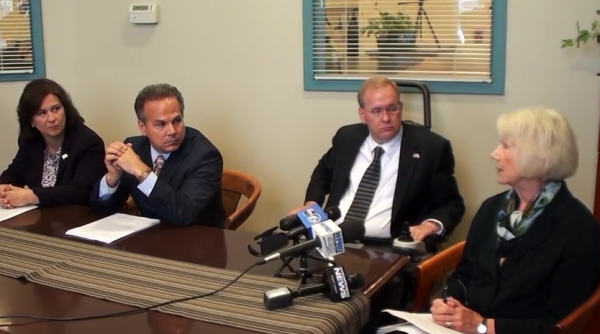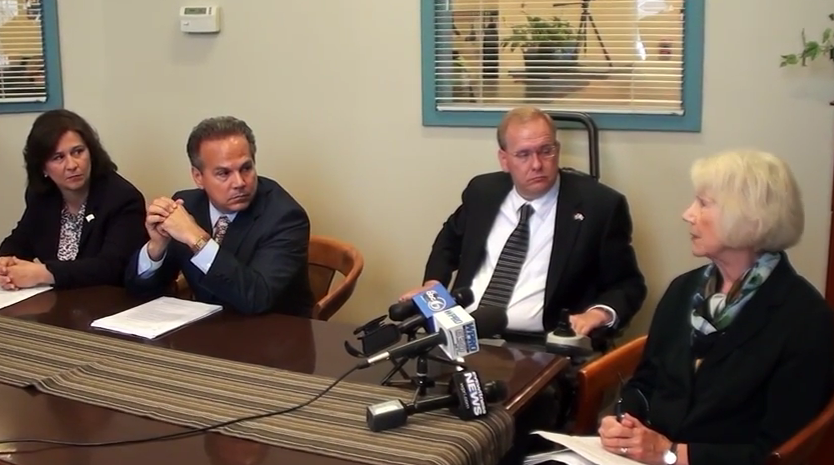
The right to vote is a key proponent in what makes the American government work. But, for many Americans, there are barriers to the expression of that right. U.S. Congressman David Cicilline (D-RI), has just introduced the Automatic Voter Registration Act (H.R. 2694), a bill that would help to break down many of those barriers, and make it easier for citizens across the country to place their ballot.
“Our democracy was founded on the principle that every citizen has the right to participate, and make their voices heard on election day,” Cicilline said in a press conference on Monday. “The right to vote is an essential part of making government work for the people it is intended to serve, but today, the right to vote is under attack by some who want to throw up new road blocks to voter participation.”
Those who are affected the most by voter suppression activities are low income and minority households. According to a Think Progress report, young people, African Americans, and Hispanics all have lower registration rates than the rest of the population. In Rhode Island, there are roughly 249,000 eligible voters who have information records at the Department of Motor Vehicles, but are not registered to vote, according to the Office of the Secretary of State.
Watch the press conference, video courtesy of Steve Ahlquist:
Cicilline’s act follows precedents set by state legislatures, most notably Oregon, and brings it to the national level. Rather than having to opt into being registered to vote, everyone will be automatically registered to vote when they turn 18 and will have a 21-day period in which they can opt out of being registered. Cicilline wants to change the current system because it makes the entry point for voting more accessible to everyone, and to make sure that more voices are heard in elections.
“It’s a significant improvement over the current system, which requires eligible voters to opt in, by registering before they’re allowed to vote. My bill reverses that presumption, and shifts the burden from the individual to the state, meaning that unless someone explicitly opts out of registering to vote, they will have the opportunity to participate on Election Day,” Cicilline said.
U.S. Congressman Jim Langevin (D-RI), Secretary of State Nellie Gorbea, and the Rhode Island chapter of the League of Women Voters Jane Koster all showed support for Cicilline’s bill. Gorbea brought the discussion down to the local level, speaking on why this bill would assist Rhode Islanders.
“As secretary of state, I am working hard to make sure all Rhode Islanders are engaged and empowered,” she said. “The way we do that is by making sure we make it easier for people to participate.”
Gorbea says the bill takes advantage of existing systems within the state, as well as technology that is readily available. Older systems and technologies, she said, keep Rhode Islanders from engaging in their civic duty far more often than it should. Gorbea is also trying to get two bills through the legislature that would provide quick and easy online voter registration as well as provide early voting opportunities, and clean up existing voter rolls.
“If we’re serious about turning our state around and creating opportunities for all Rhode Islanders, we have to ensuring that more Rhode Islanders are engaged and empowered,” she said.
“When something happens at the national level, and then you’re able to implement it, it quells the concerns of a lot of people. Why are we going to do this differently from somewhere else? We have to do this at the national level and at the local level, absolutely,” Gorbea added.
Although the demographics on the 249,000 Rhode Islanders who are eligible to vote but are not registered are not yet available, Langevin gave his own reasons as to why opting into voter registration could actually be keeping these people from actively registering.
“What I’ve found in my experience over the years, as to why people aren’t registered to vote, can fall into one of several categories. Two of the most pervasive, especially for a young person, is that one, they don’t know how to get registered to vote,” he said. “The other is that a family or an individual experienced some sort of major life change- change in job, change in neighborhood, moving to a new area, moving out of state. They come in and they’ve taken care of all the other things, and it may fall through the cracks.”
To that effect, Koster added that on average, an American moves 12 times within their lifetime, especially out of state. By making it easier to vote, states could make it easier to connect to those who are moving around often, and still give them the opportunity to participate. According to Gorbea, this would greatly reduce the “undue burden,” that is currently being thrust upon American citizens.

